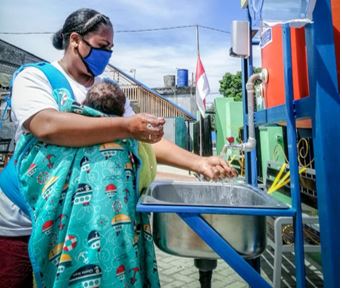
Caption: A lady washes her fingers in a handwashing place at Sentani Wellness Center, Papua. Functional Drinking water, Sanitation, and Cleanliness (Wash) products and services in wellness treatment facilities are crucial for individual safety and excellent of treatment. Photo credit rating: Sentani Wellbeing Middle
Available and practical water, sanitation and cleanliness (Clean) solutions in overall health treatment services are elementary for affected individual basic safety and high quality of care. Inadequate Clean solutions spot well being employees and people at major chance of infection and improved risk of mortality. Equal accessibility to Wash for gals and vulnerable groups requires to be ensured as an integral element of upholding human rights. What’s more, reliable application of Wash and waste administration tactics is necessary to avoid the transmission of COVID-19, in particular in wellness treatment options.
The value of Clean in well being care services is enshrined in the 2030 Agenda for Sustainable Advancement. Sustainable Progress Intention (SDG) 6 – Clean up Water and Sanitation – plainly mandates the availability and sustainable management of water and sanitation for all. In addition, Wash is necessary to obtain SDG 3 – Very good health and fitness and properly-being – especially the provision of quality important health and fitness care services. Even with global progress, just one in 4 wellbeing treatment amenities around the world absence simple drinking water solutions. Responding to the urgency to increase Clean, 194 Member States unanimously passed a resolution at the Globe Wellbeing Assembly in 2019, committing to produce nationwide roadmaps, check development and spend in Clean in health and fitness care facilities.

Fig. 1. One in 4 wellbeing treatment amenities lack standard drinking water companies
Indonesia is committed to enhancing Clean in health treatment amenities and has built sizeable development more than the final ten years. In 2011, according to the Health Facility Study (Risfaskes) report, 38% local community well being facilities (Puskesmas) surveyed did not have primary h2o providers. In the most latest survey from 2019, this percentage was diminished to 15%. Despite this development, almost 3% of Puskesmas surveyed do not exercise waste segregation, which can increase the hazard of an infection for health and fitness treatment employees, individuals and squander handlers.
To guidance Indonesia in obtaining the SDGs, WHO is performing with the Ministry of Overall health (MoH) to put into action Drinking water and Sanitation for Overall health Facility Improvement Device (Clean In shape). Wash Suit is a danger-based management approach to enhance high-quality of care via the assessment of 7 domains in health and fitness treatment services, specifically drinking water, sanitation, hand hygiene, squander administration, environmental cleansing and disinfection, power and energy, and administration. Clean Healthy allows health and fitness treatment facility professionals to prioritize dangers identified in these domains and outline and put into practice actions for enhancement.

Caption: WHO introduced the methodology to undertake Wash Match in wellness care services. Credit: WHO
On 9, 17, 19, 24, and 26 November 2020, WHO, in collaboration with MoH, properly trained individuals from across Indonesia on the application of Clean Fit and how to form productive Clean teams in overall health care services to recognize demands, gaps and to develop advancement designs. In addition, WHO spelled out techniques to increase climate resilience in health and fitness care amenities to mitigate for local weather alter-relevant disasters that may perhaps influence provider shipping and delivery, these as water scarcity and flooding. WHO also questioned to ensure that Clean in health and fitness treatment services is gender-responsive and available to susceptible groups. Guided by the facilitators, participants experienced the opportunity to perform a virtual Clean Fit assessment of and draft advancement plans for a puskesmas.

Caption: WHO presented techniques to combine gender and social inclusion in Clean infrastructure in wellness care amenities. Credit history: WHO
Throughout the Schooling of Trainers (ToT), WHO employed many approaches to stimulate interactive and lively conversations. Presenters facilitated compact team discussions in break out rooms. As advocacy get the job done is an crucial element of Wash In good shape, presenters and contributors done various position-plays to demonstrate how to advocate for Clean enhancement to overall health facility supervisors and government. Applying these approaches, members discovered not only about Clean In shape, but how to recognize possibilities and answer to widespread challenges to boost Clean in health treatment amenities. Members introduced insights from their provinces, for illustration, the worth of involving nearby authorities in the Clean In good shape assessment, cultural areas on the use of Wa
sh amenities, and the worries of scaled-down services with pretty several employees.
Around 30 contributors attended the education, which include MoH, Provincial Health Offices, the United Nations Children’s Fund (UNICEF), the United Nations Advancement Programme (UNDP), and specialist associations and NGOs that function with Wash in various provinces in Indonesia, which includes Médecins Sans Frontières/Medical practitioners Without the need of Borders (MSF), SNV Netherlands Enhancement Organization, Program International Indonesia, Yayasan Noken Papua, Indonesian Association of Environmental Wellbeing Authorities (HAKLI), Indonesian Culture of Community Health and fitness Students (PERSAKMI), and Indonesian Community Well being Affiliation (IAKMI).
By the end of the coaching, several individuals experienced drawn up plans to roll out Wash Match training programmes for Puskesmas in South Sulawesi, Papua, East Nusa Tenggara, West Nusa Tenggara, DKI Jakarta, Banten, North Sumatra, and Maluku. The MoH is further committed to establish a national street map of Clean in Well being Treatment Amenities in 2021.
Generating an enabling natural environment necessitates a multisectoral method with partnerships that do the job in synergy to strengthen Wash providers. By way of this collaboration with authorities, improvement companions and NGOs, the ToT has paved the way to improve Clean in well being treatment facilities for all.




More Stories
How Medical Practices Benefit from Virtual Assistants
How the Pupil Dilation Velocity and Pupilometer Can Be a Quick and Objective Way to Diagnose TBIs
HEALTH AND FITNESS: Recovering from vacation | Features